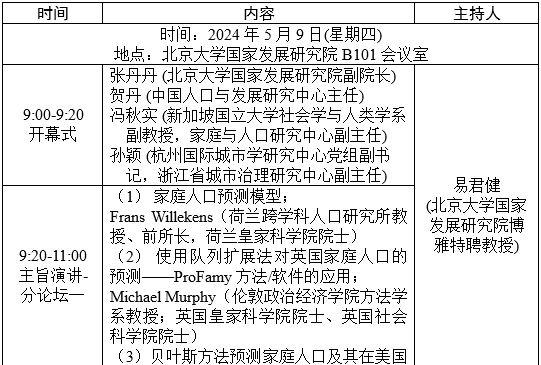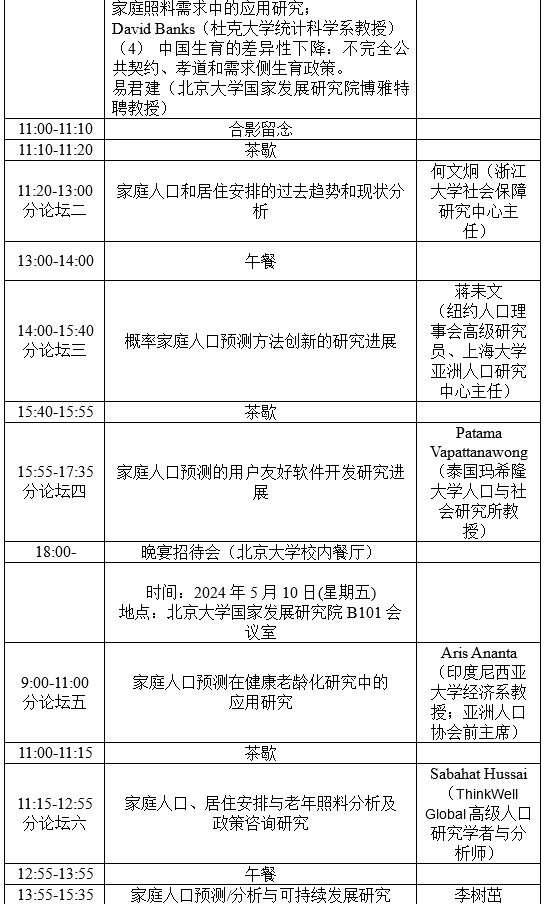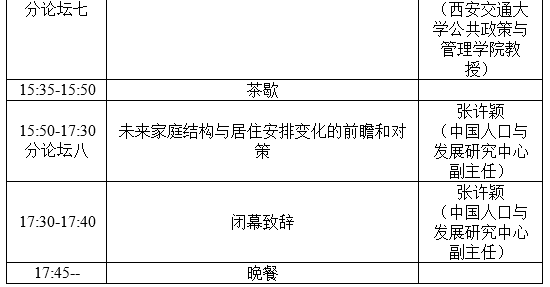2024年5月9-11日,中国北京
主办单位
北京大学国家发展研究院健康老龄与发展研究中心
中国人口与发展研究中心
新加坡国立大学家庭与人口研究中心
浙江省城市治理研究中心(杭州国际城市学研究中心)
会议日程
“多维家庭人口预测及其数据准备软件和应用”



“多维家庭人口预测及其数据准备软件和应用”
国际培训班
时间:2024年5月11日
地点:中国人口与发展研究中心4楼会议室
培训班主持人:张许颖(中国人口与发展研究中心副主任)
08:45-09:00签到
09:00-09:10开幕致辞
贺丹(中国人口与发展研究中心主任)
09:10-09:55第一部分:扩展的ProFamy用户友好软件:讲座和辅导
讲师:
王正联(中国人口与发展研究中心高级研究员)
周立全(数字健康中国技术有限公司研究项目经理)
09:55-10:10茶歇
10:10-12:30第二部分:DemoRates用户友好软件:讲座和辅导
讲师:
王正联(中国人口与发展研究中心高级研究员)
冯秋实(新加坡国立大学副教授)
莫妍(新加坡国立大学博士研究生)
孙艺(新加坡国立大学研究助理)
蔡祖齐(新加坡国立大学研究助理)
刘元颖(新加坡国立大学博士研究生)
12:30-13:30午餐
International Conference/Training Workshop on
Projections/analyses of Households and Living Arrangements, and Applications in Healthy Aging and Sustainable Development Studies
May 9-11, Beijing, China
Jointly organized by Center for Healthy Aging and Development Studies of National School of Development at Peking University, China Population and Development Research Center, Center for Families and Population Research at National University of Singapore, and Zhejiang Urban Governance Studies Center. The present international conference and training workshop are part of the research activities of the ongoing international collaborative research project on “Innovative Research on Methods of Probabilistic Households and Living Arrangement Projections and Applications in Care Needs for Older Adults and Sustainable Development in China and Other Countries”, supported by Ministry of Finance and Ministry of Foreign Affairs of China.
Contacts: Xiang Cui (2200091812@stu.pku.edu.cn, Tel. (+86) 18016421953), for international participants); Xiaolei Gao (xlgao@nsd.pku.edu.cn, Tel. (+86) 18810659912), for domestic participants).
May 9 (Thursday)
Location: Conference room B101, National School of Development at Peking University
8:45~9:00 Arrival of the participants
9:00~11:00 Opening Ceremony and Session 1 of keynote speeches
Chair: Junjian Yi (Boya Distinguished Professor, National School of Development, Peking University)
9:00~9:20 Opening Ceremony (3-5 minutes for each brief speeches)
Opening remarks by Dandan Zhang, Associate Dean, National School of Development,
Peking University
Brief speeches by:
Dan He (Director General of China Population and Development Research Center)
Qiushi Feng (Associate Professor of Department of Sociology and Anthropology, Deputy Director of
Center for Families and Population Research at National University of Singapore)
Ying Sun (Deputy Director of Zhejiang Urban Governance Studies Center and Deputy Secretary of
Hangzhou International Urbanology Research Center)
9:20~11:00; Session 1
Keynote speeches (20 minutes for each keynote speech, 20 minutes for open discussions)
Frans Willekens (Professor and former Director of Netherlands Interdisciplinary Demography
Institute, and Member of Netherlands Royal Academy of Sciences): Issues in Households and
Living Arrangements Projections;
Michael Murphy (Professor of Department of Methodology at London School of Economics and
Political Science; Member of the British Royal Academy and Member of the British Academy of
Social Sciences): Household and Living Arrangement Projections in the United Kingdom Using
the Extended Cohort-Component Method -- An application of the ProFamy Methods/software;
David Banks (Professor, Department of Statistical Science, Duke University): Probabilistic
Projections of Households and Home-based Care for the US Older Adults;
Junjian Yi (Boya Distinguished Professor, National School of Development, Peking University):
Falling Fertility Differentials in China: Incomplete Contract, Filial Piety, and Demand-side Fertility
Policies.
Open discussions.
11:00~11:10; Group photo
11:10~11:20; Coffee and tea break
Important note: All Chairs and presenters please strictly control that each presentation has a maximum of 18 minutes and each session has about 20 minutes for open questions and discussion.
11:20~13:00; Section 2
Analyses on the past trends and present statuses of households and living arrangements
Chair: Wenjiong He (Director of the Center of Social Welfare and Governance, Zhejiang University)
Aris Ananta (Professor, Department of Economics, Indonesia Universitas; former President of Asian
Population Association): Marital Status Transition Matrix in Indonesia;
Leiwen Jiang (Senior research fellow of Population Council in New York, and Director of Asian
Population Research Center, Shanghai University): Changes in household size composition and
its demographic driving forces;
Milad Bagi (Assistant Professor of Demography, Department of Social Sciences, Faculty of
Economics and Social Sciences, Bu-Ali Sina University): Past Experiences and Future Directions
of Female-Headed Households in Iran.
Shuzhuo Li (Professor of School of Public Policies and Management at Xiaan Jiaotong University):
Population Aging and Living Arrangements in Asia: Facts, Observations, and Responses.
Open discussions.
13:00~14:00; Lunch
14:00~15:40; Section 3
Research progress in methodology of probabilistic projections of households and living arrangements
Chair: Leiwen Jiang (Senior research fellow of Population Council in New York, and Director of Asian Population Research Center, Shanghai University)
Yi Zeng (Professor of Peking University and Duke University; Member of The World Academy of
Sciences (TWAS) for the Advancement of Science in Developing Countries; Foreign member of
the Royal Netherlands Academy of Arts and Sciences): Basis and Ideas of Probabilistic
Households and Living Arrangement Projections (PHPs);
Junni Zhang (Associate Professor of National School of Development at Peking University):
Bayesian Models and BayesProj R package for Probabilistically Projecting Total Marriage Rates
and Total Divorce Rates for PHPs;
Wei Tang (Postdoctoral Research Fellow of National School of Development at Peking University):
Illustrative Applications of the Bayesian Models to Estimate and Probabilistically Project Total
Marriage Rates and Total Divorce Rates for PHPs;
Man Li (Assistant Professor of School of Sociology at Soochow University) and Shanwen Zhu
(School of Humanities at Shanghai Institute of Technology): Optimized Random-combinations of
Total Fertility Rates and Life Expectancies at Birth for Probabilistic Populations, Households
and Living Arrangement Projections.
Open discussions.
15:40~15:55; Coffee and tea break
15:55~17:35; Section 4
Research progress in user-friendly software development for probabilistic projections and analyses of households and living arrangements
(This Session will present methodological development, usefulness and illustrative applications of the software, and how to use the software with tutorial practice will be presented in the Training Workshop in the morning of May 11)
Chair: Patama Vapattanawong (Professor, Institute for Population and Social Research, Mahidol University, Thailand)
Qiushi Feng (Associate Professor of Department of Sociology and Anthropology, Deputy Director of
Center for Families and Population Research at National University of Singapore): Usefulness
and Illustrative Applications of User-friendly R Software DemoRates;
Zhenglian Wang (Senior Research Fellow of China Population and Development Research Center):
Extensions of ProFamy Model by Using Summary Measures of Total Rates of Marriage/Union
Formations and Dissolutions for Probabilistic Households and Living Arrangement Projections
(PHPs)
Can Jia (Research Fellow of China Population and Development Research Center): Extensions of
the Outcomes of Three R Packages of UNPD Probabilistic Population Projections Using the
Bayesian Hierarchical Models from Excluding Rural/urban (or Race) to Rural/urban (or
Race)-Specific;
John Bryant (Director, Bayesian Demography Limited): Usefulness and Illustrative Applications of
BayesRates R Program for estimating age-specific demographic rates.
Open discussions.
18:00~; Reception and dinner at the restaurant in Peking University campus
May 10 (Friday)
Location: Room B101, at National School of Development at Peking University
8:45~9:00: Arrival of the participants
9:00~11:00; Section 5
Households and living arrangement projections/analyses for healthy aging research
Chair: Aris Ananta (Professor, Department of Economics, Indonesia Universitas; former President of Asian Population Association)
Wenjiong He (Director of the Center of Social Welfare and Governance, Zhejiang University):
Optimization of Old-age Welfare System based on Intergenerational Equilibrium
Bussarawan Puk Teerawichitchainan (Associate Professor of National University of Singapore):
Family Roles in Caring for Older Persons with Long-Term Care Needs in China and Thailand;
Jian Sun (Lecturer, College of Public Administration, Nanjing Agricultural University): Association
between community care services availability and quality of life among older adults: Evidence
from China;
Patama Vapattanawong (Professor, Institute for Population and Social Research, Mahidol
University): Demographic Situation in the Past Six Decades of Thailand
Lijing Yan (Professor and Head of NCD Research at Global Health Research Center, Duke Kunshan
University):Urban-Rural Disparities and All-cause Mortality Risk among Chinese Old Adults: the
Multiple Mediation Effect of Lifestyle Factors and Leisure Activities.
Open discussions.
11:00~11:15; Coffee and tea break
11:15~12:55; Session 6
Analyses on household and living arrangement for old age cares and policy analyses
Chair: Sabahat Hussai (Senior Research Demographer, Program Analyst, ThinkWell Global)
Xuxi Zhang (Assistant Professor, School of Public Health, Peking University Medical Center):
Development and Validation of Physical Disability Index and Mental Disability Index and their
Associations with Falls among Older Adults;
Xian Zhang (Research Fellow, Duke Kunshan University):Long-Term Care Insurance Promoted
the Diagnosis and Management of Hypertension in Older Adults;
Jianxin Li (Professor, Department of Sociology, Peking University): Analysis of Low Fertility Levels in
China;
Yao Yao (Associate Research Fellow of China Center for Health Development Studies, Peking
University Medical Center): Characteristics of and Enlightenment for Older Care in China: from
the Perspective of Family Structure Changes.
Open discussions.
12:55~13:55; Lunch
13:55~15:35; Session 7
Households and living arrangement projections/analyses and sustainable development research
Chair: Shuzhuo Li (Professor of School of Public Policies and Management at Xiaan Jiaotong University)
Sabahat Hussain (Senior Research Demographer, Program Analyst, ThinkWell Global) and
Maqsood Sadiq (Senior Research and Data Analyst, Population Council, Islamabad, Pakistan):
Updates on the Projections and analyses of Households and Living Arrangements for Pakistan;
Xiuli Liu (Professor and Director, Economic Analysis and Forecasting Science Research Lab,
Academy of Mathematics and Systems Science, Chinese Academy of Sciences): Aging
Population, Balanced Diet and China’s Grain Demand;
Augusto Schmidt (Research Associate, Campinas State University, Brazil): Household and Living
Arrangements Projections for Brazil (2010-2030);
Sihan Ji (Associate Professor Vanke School of Public Health, Tsinghua University): Green Space
and Functional Aging in China: Community and Cohort Studies;
Open discussions.
15:35~15:50; Coffee and tea break
15:50~17:30; Section 8
Perspective of changes in households and living arrangements in the future years and policy responses
Chair: Xuying Zhang (Associate Director General of China Population and Development Research Center)
Nguyen Duc Vinh (Institute of Sociology, Vietnam Academy of Social Sciences): Projection of
Household Living Arrangements in Vietnam to 2049.
Jiye Hu (Professor/Director, Department of Finance, Business School, China University of Political
Science and Law): International experience in establishing a birth support policy system
Premchand Dommaraju (Associate Professor, Division of Social Sciences, Nanyang Technological
University, Singapore):Transformations in Indian Household Structures
Xinyan Cheng (Postdoctoral Fellow, Institute of Aging, Fudan University): A Microsimulation Study of
the 8-4-2-n Families in China based on Agent-based Modeling.
Open discussions.
17:30~17:40; Closing remarks by Xuying Zhang (Associate Director General of China Population and Development Research Center)
17:45~; Dinner
May 11, 2024 (Saturday)
Program of International Training Workshop on ProFamy and DemoRates
User-friendly & Free software for Household and Living Arrangement Projections
May 11, 2024, Beijing, China
Location: Conference room, 4th floor, China Population and Development Research Center
Chair of the training workshop: Xuying Zhang (Associate Director General of China Population and Development Research Center)
8:45 - 9:00, Arrival of the participants
9:00 - 9:10, Opening Remarks
Dan He (Director General of China Population and Development Research Center)
9:10 - 9:55 (45 mins)
Session 1. Extended ProFamy user-friendly software: lectures and tutorial
Lecturers: Zhenglian Wang (Senior research fellow of China Population and Development Research Center) and Liquan Zhou (Research Program Manager, Digital Health China Technologies Co., Ltd.)
(1) “Specify Models and Data Types” mainly deals with the specifications of model design parameters, and data types of the base population.
(2) “Data Preparation” of base population and the input data such as age-sex-specific standard schedules (including application of ProFamy software to estimate the age-sex-specific net rates of leaving parental home based on two adjunct censuses data) and projected (or assumed) summary measures (such as total rates of marriage/union formations and dissolutions) for future years.
(3) “Computation of the Projection” and “View and manage the outputs” (intuitively view and manage the output of the tables and graphics of households, living arrangements and population projections in the baseline and future years).
(4) How to use the user-friendly module of ProFamy software to conduct empirical analyses on household dynamics based on census data.
9:55 - 10:10, Coffee and tea break
10:10 - 12:30 (140 mins)
Session 2. DemoRates user-friendly software: lecture and tutorial
Lecturers: Zhenglian Wang (Senior research fellow of China Population and Development Research Center), Feng Qiushi (Associate Professor, National University of Singapore (NUS)), Mo Yan (PhD Candidate, NUS), Sun Yi (Research associate, NUS), Cai Zuqi (Research assistant, NUS), Liu Yuanying (PhD Candidate, NUS)
(1) The background, design and procedure of the DemoRates R package.
(2) The use of the DemoRates R package.
(3) Parameter setting in the DemoRates R package.
(4) Data preparation of the DemoRates R package.
(5) Function and outcome of the DemoRates R package.
(6) Installment of the DemoRates R package.
(7) Application of the DemoRates R package in martial transition and fertility.
12:30-13:30; Lunch
